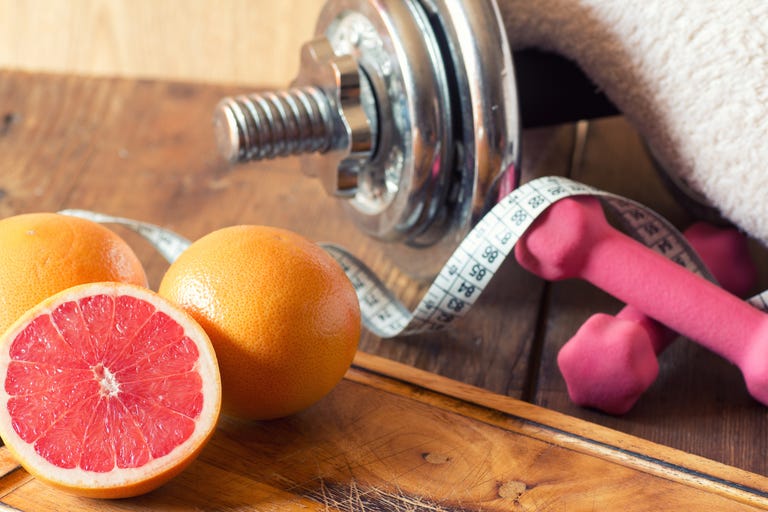There’s a microscopic chemistry lab in each of your cells, working around the clock to turn your food into fuel. Here’s how this process affects your energy, weight, and even mood — plus tips on how to make your metabolism as speedy and efficient as possible.
So what is metabolism, anyway?
Think of it as the engine within your cells that keeps you going. A car runs on gas; you run on calories, which are units of energy. Most of these calories are burned through your body simply doing its job existing: fueling your cells and keeping your heart pumping, your blood circulating, your lungs breathing, your digestive system working and your brain neurons ring (in fact, your brain alone needs about 420 calories a day just to keep functioning). You’re always incinerating calories, even while asleep. Here’s how it works:
1. You eat food.
2. Your body breaks it down into its simplest forms of carbohydrates, protein, and fat.
3. The calories in those components are converted to energy, used by your cells and tissues to grow and repair themselves.
We know what you really want to know: Is there a way to burn more — that is, to get a faster metabolism? The answer is YES. It begins with what you eat and how you move — more on these two coming up. Other factors:
Genetics: You may have a naturally faster or slower metabolism, though lifestyle still has a big impact.
Stress: Long-term stress releases hormones that screw with your digestion so your food isn’t used as efficiently.
Sleep: This is critical. When your body is short changed on zzz’s, it’s pushed into conservation mode, so you burn fewer calories.
What affects your metabolic rate?
It’s lunchtime! As your body breaks down your meal, your brain gets feedback signals — from the nutrients, your hormones, and how much you’re moving around — and “decides” whether to use the calories right then or store them. This is what impacts that decision:
How much you eat: Consistently take in more calories than you need, and a lot of what isn’t used gets stored as fat.
When you eat: Chowing down every three to four hours keeps your metabolism chugging. There may also be an advantage to front-loading calories: People who skip breakfast tend to have a surge of the hunger-boosting hormone ghrelin in the p.m., so they munch before bed. This can disrupt sleep, which messes with your metabolism.
What you eat: Skip low-nutrient simple carbs. They’re digested so quickly that they set off a cascade of metabolic reactions that soon leaves you hungry again. You'll eat more overall — hello, extra pounds! Down a combo of fibrous complex carbs and protein, which will keep you full so you’ll eat less.
Can foods burn fat? Not really.
If you believe what you see elsewhere on the internet, you probably think there are loads of miracle eats that eradicate pudge. If only! Here's the truth ...
Water with lemon: Sipping a very hot or very cold beverage may help raise metabolism — but the impact lasts only about 30 to 40 minutes after drinking it. That said, being well hydrated is crucial for maintaining a healthy weight; if adding some lemon helps you do that, go for it.
Turmeric and spicy foods: Compounds in turmeric have been linked to reduced risk of chronic inflammation, which is connected to obesity. But (sorry) more turmeric doesn’t rev your metabolism. As for spicy foods, some research has tied the capsaicin found in hot peppers to an increased metabolic rate; it also may help mobilize fat cells to be used for energy. But you’d need to eat a ton: In one study, people who took a daily capsaicin supplement for 12 weeks lost less than a pound.
Tea and coffee: A few small studies have linked a speedier metabolism to certain teas (especially green and black) and caffeinated coffee. The effect apparently comes from the combo of caffeine and flavonoids (antioxidant-like compounds); the modest benefit seems to kick in once you’ve had at least four cups in a day. However, because sleep is also key to a swifter metabolism,you’ll want to find a balance.
"Negative calorie" foods: This is not a thing, although we wish it were. There’s no scientific basis to the long-standing perception that some foods — like celery and sugar-free gum — boost metabolism because they’re low in calories and require so much chewing that you actually burn more cals than you eat.
What kinds of exercises fire up your metabolism?
There are so many reasons to exercise — it’s super-important for your heart, brain, bones, and immune system. And the more you move, the more calories you’ll burn. But exercise will not zero out a high-calorie, bad-quality diet — you just won’t burn enough. What exercising can do: make your metabolism speedier by increasing your levels of testosterone and growth hormone. So kick it up with a three-pronged approach:
Cardio: Doing intervals can be especially effective at raising your metabolic rate and burning fat. It can also produce an afterburn, meaning you’ll continue to zap cals after exercising. To do an interval workout, alternate steady movement (say, a brisk walk) with faster movement (a moderate jog). Aim for 20 to 30 minutes at least three times a week.
Strength training: Building muscle revs your metabolism. The why: Even at rest, muscle burns four times as many calories as fat, so the more muscle you have, the more you’ll burn. (That’s why men tend to have faster metabolisms — more muscle!) Do at least two weight workouts per week.
“NEAT” movement: That’s “nonexercise activity thermogenesis”: the calories expended by fidgeting during a meeting or running to the water fountain. In one study, those who did lots of NEAT movement burned as much as 2,000 cals more a day! So stroll when you’re on the phone; hit a museum rather than a movie; go to the store instead of ordering online.
How can you outsmart your weight?
First, the bummer news: For complex biological reasons, putting on major pounds can lead to a sluggish metabolism, which can mean more weight gain. Being overweight can lead to health issues (such as diabetes) that can further slow your metabolism, leading to ... you guessed it: even more weight gain.
The good news: You can flip that cycle on its head. Start with exercise. This helps you sleep and increases certain appetite-suppressing hormones; eating lean protein and less sugar and junky carbs also helps.
The hormone surge makes your metabolism crank, helping you lose pounds and get healthier. More serotonin is then produced because you’re eating and sleeping better, which can relieve symptoms of depression. A happier you is apt to be more active, which leads to an even faster metabolism. Nice work.
Elaine Chin, M.D., is the founder and chief medical officer of Executive Health Centre in Toronto, Canada. William Howatt, Ph.D. is a behavioral scientist and expert in mental health and coping skills. Jaclyn London, M.S., R.D., C.D.N., is the Nutrition Director of the Good Housekeeping Institute.
This article original appeared in the May 2018 issue of Good Housekeeping.









No comments:
Post a Comment